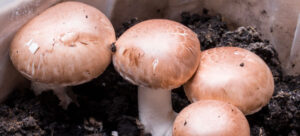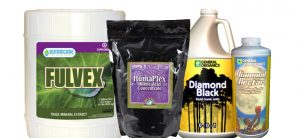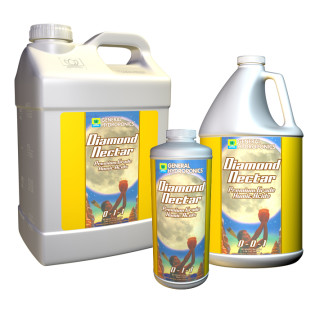
If you’ve dove into the world of plant nutrition, you’ve likely stumbled across the comparison of humic acid vs fulvic acid.
These are two vague minerals that some growers swear by, while others are unaware of their existence and importance.
Whether they’re growing indoors or outdoors, it’s no secret that plants need an extra boost of nutrients here and there. But, you also need to feed your soil.
Finding the right compounds to keep your soil healthy and fertile can be tricky, especially if you’re working with a neutral growing medium that doesn’t have a lot of fertility to begin with, such as coco. Let’s explore the benefits of humic acid vs. fulvic acid for growing plants.
What’s the difference between humic acid and fulvic acid?
There tends to be some confusion when it comes to the categorization of humic acid vs. fulvic acid.
The reason for this is that both humic and fulvic acids - along with humates - fall into the general and broad category of humic substances.
Humic substances are simply naturally-occurring organic compounds, typically resulting from plant, animal, and other matter as it decomposes.
The difference between humic and fulvic acid really lies in how they break down. Both are essential for healthy soil.
What is humic acid?
Humic acid, often referred to loosely as a “humic substance,” is an organic compound. It is a vital part of humus (the organic part of soil along with coal and peat).
In order to have healthy organic matter, you need humates, or humic acid. Humic acids are generally extracted from soil and can be coagulated to form solid pieces when an extract is acidified.
Although they are often synthetically produced from mined minerals, humic acids are considered to be beneficial for plant growth.
The molecules of humic acid attach to mineral ions like claws, helping prevent the minerals from being locked up in the soil.
Although humic acid won’t necessarily fertilize your plants directly, it can make nutrients better available for your plants to absorb. This results in greater plant efficiency and better plant health. All this adds up to a plant better suited to meet its full potential.
Humic acid benefits and uses
Humic acid presents several benefits to both indoor and outdoor growers. It's biggest benefit is preventing mineral lockout in the soil, which helps prevent nutrient deficiencies in your plant. It can also anchor nitrogen and make it more difficult for this nutrient - along with others - to be leached from the soil.
Nitrogen is one of the most common nutrients in which a plant can be deficient, so adding a humic acid supplement to your feeding regimen can definitely help reduce your fertilizer needs.
Humic acid also prevents the oxidation of iron, which is essential for plants to produce chlorophyll. When iron is oxidized, it is no longer available for plants to use in energy production.
Humic acid is also known for being an excellent soil conditioner. It has a fantastic chelating ability that allows it to attach and bond to micronutrients so that your plants can absorb them. Other nutrients that humic acid can help increase the absorption rate of include:
- Magnesium
- Calcium
- Zinc
- Manganese
Humic acid can be used during all stages of plant growth - from seed to harvest - and for any type of plant. It can be used powder that’s meant to be diluted with water, or as a liquid. This will allow you to make a foliar spray that can be applied to your plant’s leaves. Now, let’s compare it to Fulvic acid.
What is fulvic acid?
While humic acids are those that form small solid pieces when a strong base extract is acidified, fulvic acids are those that stay dissolved under the same conditions.
It is light yellow or brown but is soluble at all pH levels (both acidic and alkaline). It has a lower molecular weight, too, since it has more oxygen.
Some growers simply look at this acid as a more “sophisticated” version of humic acid, as they are so closely related.
Fulvic acid has small particles that are better able to penetrate through the tough cell wall and mitochondria. As these small particles penetrate the mitochondria, they bring along with them vital nutrients and trace minerals.
Fulvic acid beneits and uses
Fulvic acid benefits include better root development, better water and nutrient uptake, and much, much more. This additive can help stimulate root development since it does a better job at getting through the rigid cell wall. It can also help the plant absorb water more efficiently.
Due to its lower molecular weight, it is much better at crossing plant cell membranes and getting into leaves. It’s best used as a foliar spray for this very reason, but it can also be applied by mixing it into your regular irrigation system with other nutrients.
When used in conjunction with certain fertilizers like seaweed extract and kelp meal, it can be even more effective. Both of these fertilizers contain hormones that stimulate plant growth, including cytokinins and auxin. They assist with cell division and enlargement, helping increase the speed at which your plants grow. It’s important to note that humic acid can do this, too. So do you really need to use both types of acid?
Humic acid vs fulvic acid: do you need both?
Both fulvic mineral and humic acids are necessary when growing in a hydroponic system, in particular. Most hydro setups use insert media like coco or hydroton, which do not contain any kind of humic or fulvic acid.
Unfortunately, the same is also true of many soil grown plants, too. Due to mainstream gardening practices, soil is often depleted of these acids or contain only trace amounts. But do you really need both?
These acids work together synergistically
Humic and fulvic acid benefits are greater when these minerals are used in tandem. Together, humic and fulvic minerals can work in harmony to boost your plant growth. While humic acid naturally improves soil health and growth, fulvic acid will help your plants take up nutrients more effectively.
This can help save you money and time because you can reduce the amount of nutrients that you supply to your plants. Because they uptake more effectively, the concentration can be lowered.
You’ll be able to grow healthy plants at a fraction of the cost. Plus, humic and fulvic acid can improve the drainage and water retention of the soil, if you are growing in this fashion.
They support healthy microbial activity and lower the uptake of toxins - crucial if you are using synthetic fertilizers. Humic and fulvic acid can also improve photosynthesis and plant metabolism for improved growth.
Do I Really Need These Additives?
If you're growing on a budget, you might be wondering if you truly need these additives in your feeding schedule or if you can forgo them. After all, there are so many other places you can invest your growing budget - is improving soil organic matter really necessary?
The answer is, it depends. If your soil is in bad condition and could benefit from improved conditioning, then these products are likely worth investing in for your crop. But, if you are growing in a hydroponic system, you may not need these nutrients.
What are the best humic and fulvic acid supplements for plants?
Trying to find the best fulvic mineral and humic acid products for your particular crop? If so, you have come to the right place. In this section of our breakdown on these powerful minerals, we're going to share with you our favorite products.
The best fulvic and humic acid products come down to how you want to grow. If you are a home or hobby grower, just about any supplement you find on Hydrobuilder.com will work. Here are some of the highest quality products from our most reputable brands:
- General Organics Diamond Black
- General Hydroponics Diamond Nectar
- Cutting Edge Solutions Solar Gaia
- Humboldt Nutrients FlavorFul
If you are a commercial grower cultivating consumable product, you should stick with OMRI listed supplements. These are tested to the strictest standards in terms of organic inputs. Some of the best OMRI listed humic and fulvic acid supplements are:
How to feed humic and fulvic acid to plants
Now that you know which humic and fulvic acid supplements we recommend, how do you go about feeding these to your plants? Humic and fulvic acid benefits are pretty great - but alone, these two minerals won't bring your plant from seed to harvest. They are simply additives. This means you need to figure out how to make them work with your existing nutrient feeding regimen.
It is very likely you are feeding your crop a full-fledged nutrient package. If you are not, you should be! This will allow you to hit on all the nutrient and mineral needs your plants have. And, most feeding schedules contain details explaining how to go about adding additional nutrients and minerals in - which is where you'll feel your humic and fulvic acid.
Final Thoughts On Humic and Fulvic Acid For Plants
Well, there you have it - you now know all humic and fulvic acid benefits for plants. You also know how to use them, and which humic and fulvic acid supplements we recommend you use. At this point, there is only one thing left to do - head over to the site and buy your additives today!
You are just a few clicks away from securing the best nutrients and additives your plants have access to. When you shop at Hydrobuilder, you can shop in confidence knowing you're going with a brand trusted by the best growers in the industry. Whether you're a hobby grower or a commercial cultivar, we have the products and resources you need to grow your best.













